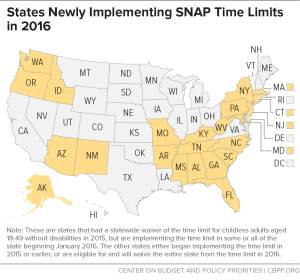
Over 500,000 Adults will Lose Assistance to Keep Food on the Table
Mary McClure
February 16, 2016
In a matter of months, over half a million people living on the margins will no longer receive a critical tool to help them get enough to eat each day.
This year, 23 states are implementing a time limit on how long certain individuals can receive food assistance thorough the Supplemental Nutrition Assistance Program (SNAP). SNAP (formerly known as food stamps) is the nation’s largest anti-hunger program. It responds quickly to changes in the economy, and serves families, individuals, children, older adults, and people with disabilities. While the majority of households that receive SNAP benefits have a person who is working, a portion of the population either cannot work or face barriers to meaningful employment.
 Catholic Social Justice calls us to uphold the dignity of each person as an equally valuable member of the human family. Because of each person’s essential dignity, everyone has a right to all that is needed to allow her or him to reach full potential. This particularly applies to basic needs, including food. Pope Benedict XVI wrote: “Jesus taught his disciples to pray by asking the Heavenly Father not for “my” but for “our” daily bread. Thus, he desired every person to feel co-responsible for his [or her] brothers [and sisters] so that no one would want for what he [or she] needs in order to live. The earth’s produce forms a gift which God has destined ‘for the entire human family’” (Angelus, 2006).* [1] l
Catholic Social Justice calls us to uphold the dignity of each person as an equally valuable member of the human family. Because of each person’s essential dignity, everyone has a right to all that is needed to allow her or him to reach full potential. This particularly applies to basic needs, including food. Pope Benedict XVI wrote: “Jesus taught his disciples to pray by asking the Heavenly Father not for “my” but for “our” daily bread. Thus, he desired every person to feel co-responsible for his [or her] brothers [and sisters] so that no one would want for what he [or she] needs in order to live. The earth’s produce forms a gift which God has destined ‘for the entire human family’” (Angelus, 2006).* [1] l
Our shared responsibility for our sisters and brothers is precisely why we are so alarmed that approximately half a million Americans will lose eligibility for SNAP benefits.
The people at risk for SNAP time limits are able-bodied adults without minor children. These are some of our nation’s most vulnerable members; research from the Center on Budget and Policy Priorities (CBPP) indicates they are a very poor, diverse, and underserved group. Because of low education and skill levels, many enter in and out of work in low-paying jobs that do not lift them out of poverty, while others experience deep poverty or chronic homelessness. These individuals are eligible for few safety net programs while they are employed and almost none for when they are not.
While the population doesn’t fit in any specific category, we know some information about the people who will be affected:
- 45% are women, 55% are men
- About 30% are over 40 years old
- About half are white, a third are African American, and a tenth are Hispanic
- They live across metro status: 41% suburban, 39% urban, and 21% rural
The time limit provision, part of the 1996 welfare law, restricts these people to three months of SNAP benefits during any 36-month period if they are not employed or in a work training program for at least 20 hours a week. Many states enacted waivers to this limit during the recession and following years due to the limited availability of jobs, but as the economy recovers, the waivers are expiring.
It is essential to note this policy is not a work requirement—it’s a time limit. This law does not require states to offer employment or job training to people who are unable to find a job, and does not provide funding for this purpose. Many states have few or no work or training programs. SNAP recipients who do not find a job, despite looking for work and a willingness to work, will still lose their benefits after three months.
Currently, it is unlikely that Congress will act to protect this group, but there are steps that states can take. States can and should waive the time limit in areas of the state still struggling with high unemployment. They should also ensure that they are not applying the time limit to exempted individuals, including many who are experiencing homelessness. Finally, states must do what they can to provide job training services to people who will be impacted so these people can continue to receive the help they need to get enough to eat and gain the skills needed to secure employment.
At NETWORK, our faithful response to food policy discussion is to ensure all people have their basic nutrition needs met. We remember the words of Pope Francis, who said “The planet has enough food for all, but it seems that there is a lack of willingness to share it with everyone” (Homily, 2015). [2] It is wrong to impose a time limit on this safety net program, especially when adequate resources are not provided to ensure employment for a very vulnerable group. It is wrong that in the wealthiest nation on earth, people still go hungry. We must continue to bring faithful voices and attention to the problem to our friends and neighbors.
For a more in-depth look at SNAP time limits, please visit the report from CBPP.
*Quote adapted with brackets for gender inclusivity






